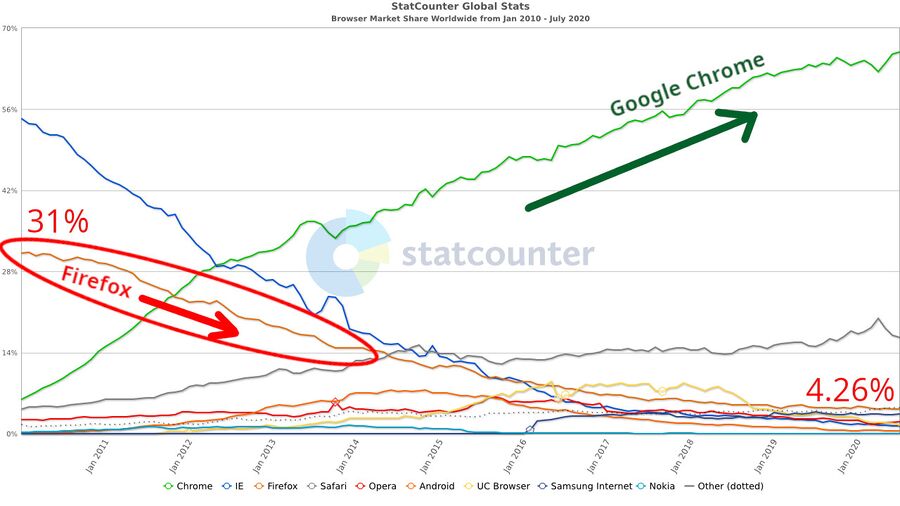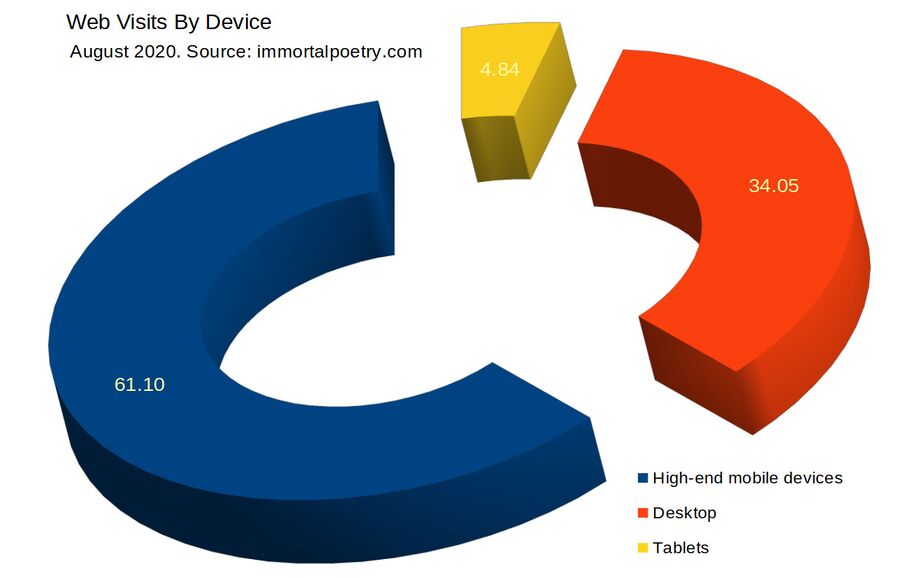Mozilla Fires 250 Employees, Blames COVID-19 For Years Of Mismanagement
The only web browser standing between full spectrum dominance of Chromium-based browsers and a realistic choice suffered a huge set-back last week when the Mozilla Corporation fired 250 employees. Years of declining marketshare and income is forcing their hand. Mozilla Corporation CEO Mitchell Baker claims COVID-19 is why Firefox's overall market share has dropped from 31% in 2010 to 4.26% in 2020.
written by 윤채경 (Yoon Chae-kyung) 2020-08-19 - last edited 2020-08-27. © CC BY

Mozilla Firefox went from being a fairly common web browser with a 31% market share in 2010 to being a almost irrelevant web browser with a mere 4.26% market share in August 2020.
The Mozilla Corporation's Mozilla Firefox web browser product has been steadily losing market share for more than a decade. It dominated a third of the web browser market with a 31% market share in January 2010. That number declined to 10% in July 2015. Firefox lost more than half of that the coming years. Only 4.26% of all web browser users are using Firefox today. The situation is slightly better if we zoom in on the desktop users: Firefox enjoys a 8.61% market share on desktops and laptops while the mobile market share is close to nothing at 0.48%. All these figures are based on data from statcounter.
Dwindling market share, and dwindling income as a result of that, prompted Mozilla to fire 70 employees in January 2020. Mozilla Corporation CEO and Chief Executive Officer and Chairwoman of Mozilla Foundation Mitchell Baker notified that another 250 people will have to look for new jobs in an sent an internal message (pdf) circulated on August 11th, 2020.
The internal message memo blames the layoffs on a supposed SARS-COV-2 impact on the Mozilla Corporations finances:
"Pre-COVID, our plan for 2020 was a year of change: building a better internet by accelerating product value in Firefox, increasing innovation, and adjusting our finances to ensure financial stability over the long term. We started with immediate cost-saving measures such as pausing our hiring, reducing ourwellness stipend and cancelling our All-Hands. But COVID-19 has accelerated the need andmagnified the depth for these changes. Our pre-COVID plan is no longer workable. We havetalked about the need for change — including the likelihood of layoffs — since the spring. Today these changes become real."
August 11th, 2020
A very large amount of people have been working from home this year due to SARS-COV-2 lock-downs and hysteria in most countries. Sweden is one of the few exceptions. The year over year death rate in Sweden is currently below the five year average even though Sweden did not have any lock-downs and face-masks are not mandatory. The rest of the world did lock down which meant many more potential customers for a corporation like Mozilla who's market consists of people using phones and computers. The Mozilla Corporation is claiming that this recent huge increase in its potential customer-base is why it is finding itself in a position where it can no longer afford to keep paying 250 now former members of its workforce.
The World Is Mobile[edit]

Devices people use to read poetry at Immortal Poetry. Data from August 2020.
About two thirds of people browsing the web use mobile phones to do so. Mozilla, with a mobile marketshare of just 0.48%, has failed miserably in the mobile market segment. Their lager 8.61% share of the desktop/laptop market means less when only a third of web visits are done using those devices.
Google and other search engines pay the Mozilla Corporation to feature them in the Firefox web browser on a per-traffic basis. A declining desktop market share combined with a complete and utter failure to gain any foot-hold in the mobile market, combined with a complete and utter waste of resources on "diversity", activism for Marxist causes and things like that, is why the Mozilla Corporation is struggling.
Things have been going down-hill for Mozilla for more than a decade. You can't blame their many bad decisions on a recent development like SARS-COV-2.
A "New" Organization[edit]
Mozilla will be restructuring what remains of their organization after 250 employees are let go. Their office in Taipei, Taiwan, will be closed.
"We are also restructuring to put a crisper focus on new product development and go to market activities. In the long run, I am confident that the new organizational structure will serve our product and market impact goals well, but we will talk in detail about this in a bit."
Mozilla will, according to their internal memo of August 11th, focus on four areas:
- Firefox users
- "Investing in new products"
- "Supporting functions"
- "Reinvigorating Community"
A few other areas are being de-prioritized. Mozilla will "reduce" investment in "developer tools, internal tooling and platform feature development".
The "new products" Mozilla will focus on are the existing old products Pocket, Hubs, WPN, Web Assembly and perhaps new "security and privacy" products. They will also be forming a new "applied Machine Learning" team.
Mozilla plans to centralize many of their support functions. IT and "engineering operations" will be combined into one unit. Marketing will be handled by a single team tasked with marketing everything ranging from the Firefox browser to their virtual private network offerings to "new products".
The last of their new goals, "Reinvigorating Community", is a welcome one for everyone who has ever participated in, or just read, the Mozilla Bugzilla. Discussion is generally not allowed, bugs are closed without being fixed or left open for decades and the Mozilla employees who control it are mostly so hostile, arrogant and uncooperative it is almost like they are hell-bent on making anyone who shows up there go away as fast as possible.
"Fixing the internet is a huge goal. It’s not something that we can do alone. We are re-envisioning how we collaborate with, support and grow our community. This will include continued but leaner work with our community on things like product support and developer relations"
It will be interesting to see if Mozilla follows through and actually listens to developers of web browser extensions like Ublock Origin instead of telling them to shut up and go away.
Welcome To The Web Browser Monopoly[edit]
There are many web browsers to choose from on mobile devices running the Android operating system. The vast majority of them use WebView which is, essentially, Chromium for Android. You can choose different wrappings but you'll get the same rendering engine no matter what you choose.
The same is mostly true when it comes to desktops and laptops. Microsoft Edge, available for Windows, iOS, macOS and Android, but not Linux, is basically Google Chrome with a different skin. The Brave Web Browser is also based on the Chromium codebase. They are all, at their core, the same web browser. Google decides what goes into Chromium (though it is technically developed "in collaboration" with others). They can dictate how long HTTPS certificates can be valid, what the de-facto web standards are and much more.
GNU/Linux desktop users may think they have choices beyond Chromium and Firefox. Browsers like Dooble and Falkon do exist. Both of those use QtWebEngine to render web pages. And QtWebEngine is... Chromium wrapped in a neat Qt package.
There are, in reality, just three major web page rendering engines: Chromium/Blink, WebKit (controlled by Apple and mainly used on Apple devices) and the Firefox Gecko rendering engine (not counting Goanna Gecko fork used by Pale Moon). It is therefore sad to see Mozilla letting 250 people go. Firefox and the Gecko rendering engine will likely suffer as a result. It would be a bit sad if Google-controlled Chromium becomes the only game in town - even though it would not make much of a difference. Google has been in a position where they can dictate what's what on the web for quite some time.


Enable comment auto-refresher
Intgr
Permalink |
Intgr